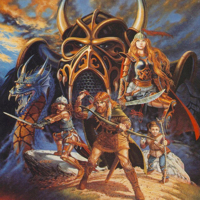Rascals case in brief
In the beginning, in 1989, more than 90 children at the Little Rascals Day Care Center in Edenton, North Carolina, accused a total of 20 adults with 429 instances of sexual abuse over a three-year period. It may have all begun with one parent’s complaint about punishment given her child.
Among the alleged perpetrators: the sheriff and mayor. But prosecutors would charge only Robin Byrum, Darlene Harris, Elizabeth “Betsy” Kelly, Robert “Bob” Kelly, Willard Scott Privott, Shelley Stone and Dawn Wilson – the Edenton 7.
Along with sodomy and beatings, allegations included a baby killed with a handgun, a child being hung upside down from a tree and being set on fire and countless other fantastic incidents involving spaceships, hot air balloons, pirate ships and trained sharks.
By the time prosecutors dropped the last charges in 1997, Little Rascals had become North Carolina’s longest and most costly criminal trial. Prosecutors kept defendants jailed in hopes at least one would turn against their supposed co-conspirators. Remarkably, none did. Another shameful record: Five defendants had to wait longer to face their accusers in court than anyone else in North Carolina history.
Between 1991 and 1997, Ofra Bikel produced three extraordinary episodes on the Little Rascals case for the PBS series “Frontline.” Although “Innocence Lost” did not deter prosecutors, it exposed their tactics and fostered nationwide skepticism and dismay.
With each passing year, the absurdity of the Little Rascals charges has become more obvious. But no admission of error has ever come from prosecutors, police, interviewers or parents. This site is devoted to the issues raised by this case.
On Facebook
Click for earlier Facebook posts archived on this site
Click to go to
Today’s random selection from the Little Rascals Day Care archives….
Click for earlier Facebook posts archived on this site
Click to go to
Today’s random selection from the Little Rascals Day Care archives….
‘No abuse until the interviews began….’
Feb. 11, 2013
“After reading a number of these interviews (of children) in the Wee Care (Kelly Michaels) case, it is difficult to believe that adults charged with the care and protection of young children would be allowed to use the vocabulary that they used in these interviews, that they would be allowed to interact with the children in such sexually explicit ways, or that they would be allowed to bully and frighten their child witnesses in such a shocking manner. No amount of evidence that sexual abuse had actually occurred could ever justify the use of these techniques especially with three- and four-year-old children.
“Above and beyond the great stress, intimidation, and embarrassment that many of the children so obviously suffered during the interviews, we are deeply concerned about the long-lasting harmful effects of persuading children that they have been horribly sexually and physically abused, when in fact there may have been no abuse until the interviews began….”
– From an amicus curiae brief to the Appellate Court of New Jersey from Stephen Ceci and Maggie Bruck on behalf of the 46-member Committee of Concerned Social Scientists (1994)
Why the panic ‘needs to be remembered’
 April 22, 2013
April 22, 2013
“Lecturing recently, I mentioned the American witch-hunts of the 1980s and 1990s. When the audience looked puzzled, I explained that I was referring to the Satanic Panic of those years, the wave of false charges concerning ritual child abuse and devil cults that made regular headlines in the decade after 1984. The explanation helped little.
“Even people who had lived through those years, who had been following the media closely, had precisely no recollection. Lost in memory it may be, but the Satanic Panic needs to be remembered, if only to prevent a renewed outbreak of this horrible farrago. And when better than in the 30th anniversary of the affair’s beginning?
“It all started in southern California, in Manhattan Beach, in the Fall of 1983….”
– From “Remember the Satanic Panic” (Jan. 9, 2013) by Philip Jenkins, Distinguished Professor of History at Baylor University, on Real Clear Religion
I share Dr. Jenkins’ concern about public memory, of course.
Which are more worrisome – those who have no recollection at all of cases such as McMartin and Little Rascals, or those who have forgotten they all were hoaxes?
Remember when ‘ritual abuse’ was a hot topic?
 Aug. 19, 2013
Aug. 19, 2013
A brief visual aside, courtesy of the Google books Ngram Viewer:
However much frustration I feel in pursuing exoneration for the Edenton Seven – plenty! – I do take some reassurance in watching the ritual abuse moral panic slowly lose its hold on public discourse, as shown in the Ngram above or here.
Remember Dungeons & Dragons – and ‘satanic ritual abuse’?
 Sept. 9, 2016
Sept. 9, 2016
“Strange what we worry about when it comes to our children. A great deal of the culture-war politics of the 1980s consisted of theatrical wailing about threats to our children that were either entirely made up or wildly exaggerated: The boys in ‘Stranger Things’ love to play Dungeons & Dragons, and, in a rare oversight, the series does not even touch on the minor cultural panic surrounding that game in places such as small-town Indiana, where D&D’s supernatural elements sparked terrified tales of occult experimentation.
“It’s not for nothing that this came around the same time as the Salem-style mass hysteria over ‘Satanic ritual abuse’ at the nation’s child-care centers, with fanciful worries about Luciferian cults obscuring the more straightforward anxiety associated with abandoning one’s children to child-care facilities. Yesterday’s Satanic cultists and Alar [a controversial apple growth inhibitor] are today’s online predators and brain-scrambling vaccinations….”
– From “Familiar Things: The TV series ‘Stranger Things’ portrays family breakdown yesterday and today” by Kevin D. Williamson in National Review (Aug. 29)
…and clowns?
![]()











0 CommentsComment on Facebook